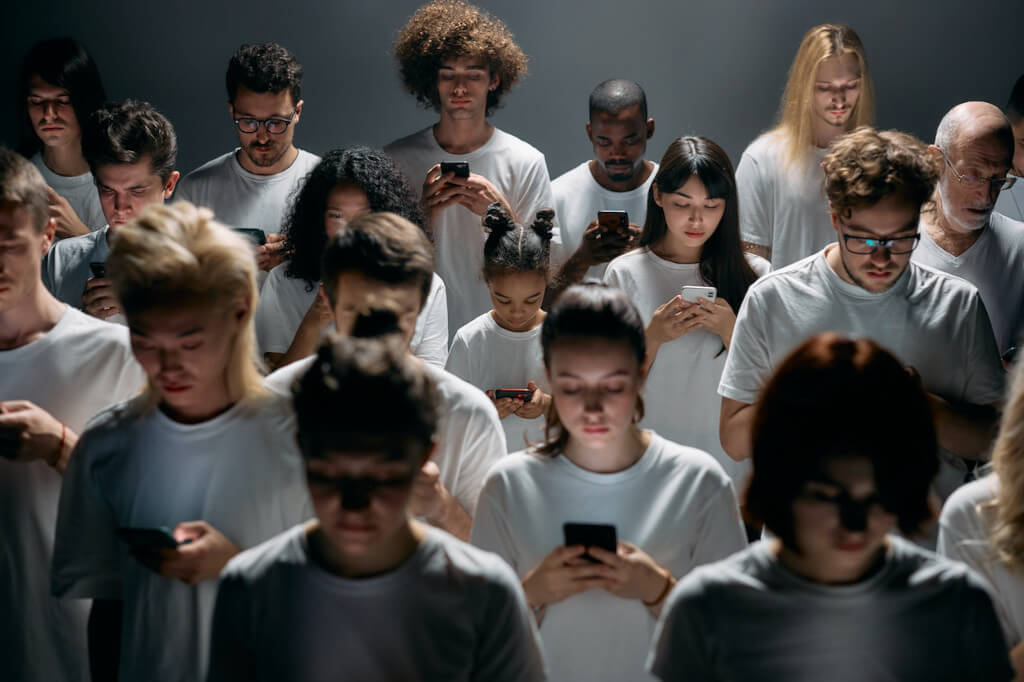Breaking Free and Managing Smartphone and Internet Addiction

Have concerns about your computer or phone use? By following these guidelines, you can break your addiction and find a healthier balance between your online and offline life.
Define Smartphone or Internet Addiction
While a laptop, iPad, or mobile phone can be incredibly useful, excessive use can have negative effects on a person’s professional life, academic performance, and personal relationships. If you find yourself spending more time online, on social networks, or playing online games than with actual people, or if you find yourself monitoring your phone multiple times per hour for messages or notifications despite the adverse effects this has on your life, it could be a good idea to reconsider how much you’re wasting on technology.
Nomophobia (the fear of not having a smartphone) is the common nickname for mobile phone addiction, which is frequently bolstered by a web overuse issue or an internet addiction disorder. The games, apps, and virtual worlds that we have access to through our mobile devices are usually what causes us to become addicted. Addiction to smartphones can lead to issues with impulse control that range from:
Connections in Cyberspace
Social media, online dating, text messaging, and communications may become so addicting that online connections begin to matter more than in-person friendships. We’ve all witnessed partners at a restaurant who aren’t talking to each other because they’re too busy looking at their smartphones. Online conversations aren’t a healthy replacement for face-to-face interactions, but the internet is a wonderful way to meet new folks, reunite with old friends, and even initiate intimate relationships. Because of the expectations and pressures of real-life relationships, it’s no surprise that many people prefer the relative simplicity of online relationships. Using online dating compulsively can make you less interested in building meaningful connections with people and more focused on finding quick flings.
Inundation of Data
Your efficiency at your job or school can suffer and your social isolation can increase if you have a problem with compulsive use of electronic media, such as the internet, for extended periods. Abnormally high amounts of time spent online or using a mobile app can lead to a loss of interest in, or even disinterest in, other areas of life, such as personal relationships or extracurricular activities.
Addiction to Online Sex
Online porn, sexting, nude-swapping, and the use of adult messaging systems are all forms of addictive behavior that can have a harmful influence on a person’s real connections and mental health if used excessively. Cybersex and other forms of internet porn are a growing problem, and the anonymity and convenience of the internet are helping to fuel this epidemic. Spending hours in real-life-impossible fantasies is a breeze. Casual sex dating apps are convenient, but their overuse can hinder the development of meaningful relationships and even damage those that already exist.
Addictions to things like video games, gambling sites, the stock market, shopping online, and online marketplace web pages like eBay can have serious consequences for one’s finances and professional life. Internet gambling has greatly increased the accessibility of gambling at a time when problem gambling has been recognized for many years. Internet shopping and stock trading addictions may be equally destructive both economically and socially. A person who is addicted to eBay might get up at odd hours just to make sure they don’t miss the final seconds of an auction. Sometimes the thrill of a successful bid can lead to the purchase of items for which there is no practical or financial need.
Effects of Excessive Smartphone and Online Use, as Well as Their Root Causes
If you have trouble controlling your impulses around a desktop or laptop computer, you may find that the portability and ease of use of tablets and smartphones make it easier to give in to those urges whenever they arise. We rarely venture further than 1.5 meters from our phones, on average. They have the potential to affect your mood in a similar way that substances such as alcohol and drugs do. You can quickly develop a tolerance for screen time, making it take longer and longer to experience the same level of pleasure.
Problems like stress, anxiousness, depressed moods, or isolation may lie beneath the surface of excessive smartphone use. However, it may make matters even worse. You will isolate yourself even more if you utilize your smartphone as a “safety net” to ease emotions of anxiousness, isolation, or lack of social skills, for instance. The benefits of social connection reduced stress, and improved mood can all be lost if you spend too much time staring at your phone. To put it another way, your chosen treatment for anxiety (actively using your smartphone) is having the opposite effect. Addiction to your smartphone or the internet can have similar unfavorable effects:
Rising rates of isolation and despair
Losing yourself online can appear to be a good way to temporarily relieve negative emotions like loneliness, depression, and tedium, but it can have the opposite effect. Anxiety and depression were linked to heavy use of social media in a study conducted in 2014. People, particularly youngsters, can develop feelings of isolation and depression as a result of making unfavorable social comparisons on social media.
Contributing to the development of worry
One study found that having phones around the office made individuals more anxious and less productive. Higher levels of anxiety were observed in those who used their phones more frequently.
Tensions are rising
Because of the convenience of smartphones, work can easily be carried over into one’s personal life. You feel like you can’t afford to turn off your work phone or computer. The pressure to periodically watch and reply to emails may be adding to stress quantities and leading to burnout.
Intensifying the effects of ADD
Due to the smartphone’s continual notifications, it can be difficult to maintain concentration on one task for more than a couple of minutes before feeling the urge to switch gears.
Lessening one’s capacity for in-depth thought or originality
Constant interruptions from your phone—whether they be a buzz, ping, or beep—can slow you down, divert your attention, and deprive you of the solitude necessary for creative problem-solving. We no longer have to be lonely or isolated because we can always access the internet and stay in touch with others.
Keeping you awake at night
Lack of quality sleep may hurt your mental health, and extreme mobile phone use is a known disruptor of sleep. Memory loss, clouded judgment, and impaired intelligence are all possible outcomes.
Early Signs of Smartphone Dependency
A dependency or the overuse of the problem cannot be determined by how much time you spend on your phone, how often you watch for notifications, or how many texts you send or receive.
A problem arises when being constantly linked to your phone prevents you from engaging in face-to-face interactions, performing at your best at work or school, or enjoying your favorite pastimes. You need to reevaluate your cellphone use and discover a healthy equilibrium if you find yourself completely disregarding friends over lunch to read Facebook posts or inspecting your phone obsessively while driving or during school presentations. Red flags for excessive smartphone or internet use include:
Frustration with not being able to finish projects at work or home
Do you come home to a mountain of dirty clothes and an empty fridge because you’ve been too preoccupied with social media, texting, or gaming to do any housework? Maybe you’ve noticed that you’re staying at the office later and later because you just can’t seem to get everything done on time.
Separation from loved ones
- Is your relationship with others weakened by the amount of time you devote to your mobile or another electronic gadget?
- Do you frequently check your phone during meetings and conversations, causing you to miss key points?
- Do you have worried friends and family members who have noticed how much you’re spending on your phone?
- Do you find that no one, not even your partner, “in real life,” can relate to you the way your online relationships do?
Keep your cellphone use under wraps
Do you try to find a secluded area to make a call? Do you try to keep your smartphone usage a secret from your boss and family? How annoyed or short-tempered do you get when someone interrupts your time online?
Fearing losing out on something or someone important (or FOMO)
Is it bothersome to you that you might be missing out on some vital information or news if you don’t glance at your cell phone every few minutes? Do you feel the need for constant reassurance by navigating social media because you worry that everyone else is happier and more successful than you are? Check your phone late at night?
Advice for Overcoming an Addiction to Your Phone or the Internet
Numerous strategies exist for taming the incessant tapping of smartphone screens and web browser tabs. Although many of these steps can be taken of the addict’s own volition, it is difficult to overcome an addiction without assistance, particularly when the urge is so close at hand. It’s far too simple to revert to previous practices. Seek help from people outside of yourself, such as friends, family, or a therapist.
Tracking when and for how long you use your phone for things that aren’t work-related or necessary can help you zero in on your weak spots. Certain apps can assist with this, allowing you to monitor how much time is spent in this manner. Is there a specific time of day when you’re the most likely to pull out your phone? Can you think of anything else you might be doing right now? The more you learn about your smartphone use, the simpler it will be to rein in your habits and take back your time.
Find Out What Causes You to Automatically Reach for Your Mobile
When you’re all by yourself and have nothing to do? For those who suffer from mental health issues like depression, stress, or anxiety, turning to their phones may be a form of self-soothing. Instead, you should work on methods that are both healthy and effective for managing your emotions, such as learning how to relax.
Realize That There Are Significant Distinctions Between Online and in-person Communication
We as a species thrive in group settings. We weren’t created to live in solitary confinement or to substitute virtual communication for actual conversation. Making eye contact and replying to another person’s body posture during a face-to-face social interaction is a quick and effective way to reduce stress and increase feelings of calm, safety, and understanding. Having the same impact on your state of mind, digital communication like texting, emailing, and messaging skips over these nonverbal cues. Furthermore, virtual friends can’t comfort you in times of need, come visit when you’re sick, or share in your joy when something good happens.
Acquire Coping Mechanisms
Maybe when you’re feeling overwhelmed or angry, you vent your feelings through social media. As an alternative, you may have difficulty interacting with others in person but thrive in virtual communities. Developing expertise in such aspects will equip you to deal with life’s challenges without reaching for your phone.
Find the Source of Your Issues and Fix Them if They’re Contributing to Your Addictive Behaviour
Have you ever struggled with substance abuse? Are there any aspects of your cellphone use that brings to mind how you used to self-medicate with alcohol or drugs?
Make Your Network of Friends and Family Stronger
Make sure you schedule weekly time to spend with loved ones. If you’re shy, you don’t need the online world or social networks to conquer your anxiety about meeting new people and forming meaningful relationships with them. Try reaching out to coworkers, participating in a soccer team or book club, taking a class, or volunteering to meet people who share your interests. You’ll have the chance to meet people with similar interests to you, ease into new friendships, and improve both your social and physical well-being.







